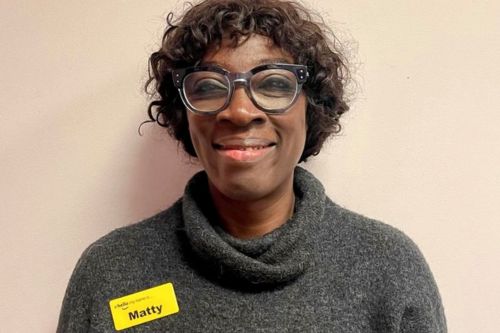Sickle Cell Community Matron awarded an MBE in the King’s New Years Honours List

31 Dec 2024
Matty Asante-Owusu, Sickle Cell Community Matron at Whittington Health NHS Trust, has been acknowledged on the New Years Honours List for her services to patients with sickle cell disorder.
Full story
We're pleased to announce that Matilda Asante-Owusu (Matty), Sickle Cell Community Matron at our organisation, has been awarded an MBE in the King's New Years Honours list.
Matty has dedicated 36 years to the NHS.
Her journey began in 1988 when she started her training at Bloomsbury School of Nursing and undertook her nursing placements at Whittington Health, before qualifying in 1991.
During her early career working within Haematology, Matty discovered her passion for supporting patients with sickle cell disorder after caring for a group of individuals living with the condition.
This experience inspired her to specialise in this field, becoming the very first Sickle Cell Community Matron - a role that enables her to provide personalised care to patients with sickle cell disorder in their homes.
Sickle cell disorder is a very serious lifelong health condition that causes unusually shaped red blood cells. This can cause problems because these kinds of cells do not live as long as healthy blood cells and can block blood vessels.
People with sickle cell disorder need treatment throughout their lives and experience painful episodes called sickle cell crises, which can be very severe and last for days or weeks.
Whittington Health supports over 300 adults living with sickle cell disorder, and Matty’s work extends beyond Whittington patients to include patients who receive their care at University College London Hospitals NHS Foundation Trust (UCLH) and live in Camden. Matty’s home visits range from things like post-hospital admission check-ups to routine health assessments.
Home visits are important for patients who live with chronic illnesses, as they allow NHS staff to build stronger relationships with patients and help to increase patient engagement with our services. But it’s particularly important for patients who live with red cell disorders like sickle cell, as longstanding health inequalities, often underpinned by racism, mean that some patients avoid coming to hospital.
Living well with a life-long chronic condition also requires a holistic approach to care, as patients who live with sickle cell disorder are at a higher risk of becoming isolated because of the impact the condition has on their social life and their professional life and Matty has been instrumental in creating initiatives to combat this.
She established a social club for older men with red cell disorders, offering them an opportunity to connect over dinner each month. Additionally, she set up the ‘Patient Users Group,’ which brings patients together to hear from expert speakers on topics such as advancements in red cell disorder research, nutrition, and vaccinations.
Reflecting on receiving her MBE for services to patients with sickle cell disorder, Matty said:
“When I first saw the letter on the floor, I thought it was a fine! Opening it was a complete shock, but also an incredible moment. I feel deeply honoured and overwhelmed by this recognition.
"My motivation has always been my patients. They are at the heart of everything I do. There’s a real emotional side to my work, but what drives me every day is the opportunity to make a difference in their lives.
“Good patient care motivates me. I want to see patients with sickle cell receiving the care and support they deserve. This award is a step forward in raising awareness of the challenges these patients face and the importance of addressing them.”

